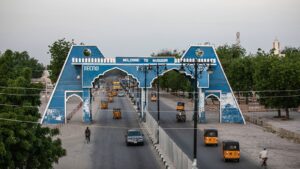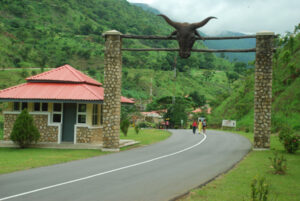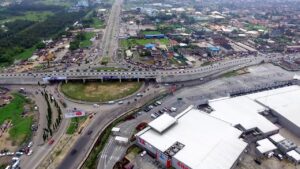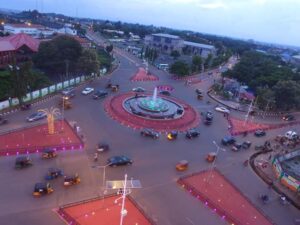Everything you need to know about 36 Nigerian states [Population, Economy, How they got their names]
![Everything you need to know about 36 Nigerian states [Population, Economy, How they got their names]](https://naijmobile.com/wp-content/uploads/Abuj-city-gate.jpg)
Borno
Borno, also known as Borno State, is a state in north-eastern Nigeria. Its capital and largest city is Maiduguri. The state was formed in 1976 from the split of the North-Eastern State. Until 1991 it contained what is now Yobe State. The motto or slogan of the state is “Home of Peace”. Borno is the homeland of the Kanuri people in Nigeria and several other ethnic groups

Borno has been the epicenter of the Islamist group Boko Haram since it began its insurgency in 2009. The conflict in Borno drew media attention in 2009 after clashes between Boko Haram and government security forces in which the founder of Boko Haram Mohammed Yusuf was reportedly captured alongside 300 of its members. Days later Mohammed Yusuf was announced dead after he reportedly attempted to escape from detention
Borno Population
Borno State with 27 Local Government Areas with Population of 6,272,536 (Male- 3,198,993 and Female- 3,073,543)
Borno Economy
Agriculture forms the backbone of the Borno State economy
How Borno got their name
The alternative name of the Kanuris, the predominant ethnic group in the state, is ‘Borno’ which gave inspiration for the naming of the state.
Cross River
Cross River is a state in South-South Nigeria, bordering Cameroon to the east. Its capital is Calabar and its name is derived from the Cross River (Oyono), which passes through the state. English, French, are the major foreign languages of the state while Bekwarra, Ejagham and Efik are major indigenous languages of this state. Ejagham remains the largest ethnic group that stretches from the northern senatorial district to the southern senatorial district.

Cross River Population
Cross River State derives its name from the Cross River which passes through the state. It is a coastal state located in the Niger Delta region and occupies 20,156 square kilometers with a population of 3,737,517.
Cross River Economy
Cross River State has a mainly agrarian economy with about 75% of its people engaged in subsistence farming. Poverty is endemic with over 70% of the population living on an income of less than US$ 1 a day. The civil service is a major employer with over 20,000 employees. The public sector has been the prime mover of all economic activities in the State despite some attempts to promote private sector investment.
How Borno got their name
The state took its name from a River called Oyono or Cross River.
Delta
Delta State (recognized on August 27, 1991) is an oil and agricultural producing state in Nigeria. It is situated in the region known as the South-South geo-political zone. The capital city is Asaba, located at the northern end of the state, with an estimated area of 762 square kilometres (294 sq mi), while Warri is the economic nerve center of the state and also the most populated. It is located in the southern end of the state. The state has a total land area of 16,842 square kilometres (6,503 sq mi).

Delta Population
Delta is situated in the region known as the South-South geo-political zone with a population of 4,112,445 (males: 2,069,309; females: 2,043,136).
Delta Economy
Agriculture is the mainstay of the state’s economy; yams, cassava (manioc), oil palm produce, rice, and corn (maize) are grown for local consumption. Delta is a major exporter of petroleum, rubber, timber, and palm oil and palm kernels via the Niger delta ports of Burutu, Forcados, Koko, Sapele, and Warri.
How Delta got their name
The state is where the River Niger forms a delta as it enters the Atlantic Ocean.
Ebonyi
Ebonyi State is in southeastern Nigeria. It is inhabited and populated primarily by the Igbo with the city of Abakaliki as its capital and largest city. Other major townships include Afikpo, Onueke, Ezzamgbo, Edda, Effium, Aba Omege, Amasiri, Unwana, Echara Ikwo, Egu-Ubia, Ụbụrụ, Onicha, etc. It was one of the six states created in 1996 by the then federal military government of General Sani Abacha.

Ebonyi Population
Ebonyi was created from parts of both Enugu State and Abia State with a population of 2,176,947
Ebonyi Economy
Ebonyi is primarily an agricultural region. It is a leading producer of rice, yam, potatoes, maize, beans, and cassava in Nigeria. Rice is predominantly cultivated in Ikwo, yams in Izzi, with other regions in the state such as Amasiri, Edda and Ezillo making notable contributions, and Effium and Ezzamgb taking the top spots in cassava production.
How Ebonyi got their name
Ebonyi is the anglicised version of ‘Aboine’, a river that cuts through Abakaliki, the state capital.



